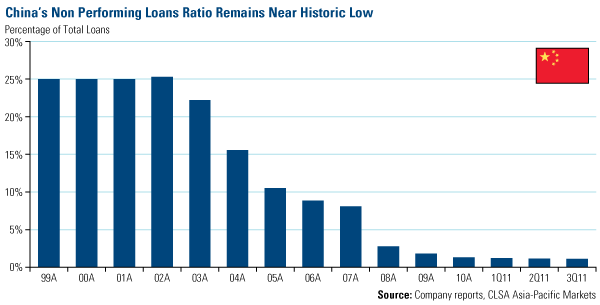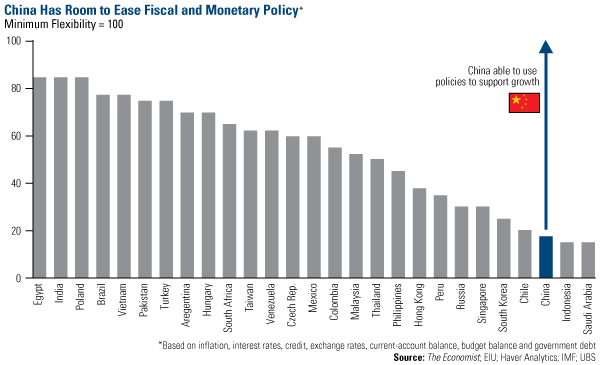Why Chinese Economy Won't Collapse, Premier Wen Real Story
Economics / China Economy Mar 07, 2012 - 10:32 AM GMTBy: Money_Morning
 Keith Fitz-Gerald writes:
According to Premier Wen Jiabao on Monday, China is only going to grow at 7.5% this year.
Keith Fitz-Gerald writes:
According to Premier Wen Jiabao on Monday, China is only going to grow at 7.5% this year.
But this isn't the bombshell most Western analysts think it is-even though the markets sold off on the day and may continue their temper tantrum later this week.
It's actually what Premier Wen didn't say that really matters. As is so often the case in China, it's what goes on behind the scene that is far more interesting - and actionable.
In that sense, Premier Wen's comments aren't really news at all, but rather recognition of the symbolic priorities attached to Chinese growth.
As I have talked about at length in the past, China needs to do three things this year: 1) keep growth in line, 2) promote monetary stability and 3) be flexible with regard to inflation.
What makes Wen's 7.5% GDP figure significant is that in dropping it by half a percent, Premier Wen is not saying, but, in fact, telegraphing two things:
•China's domestic growth priorities have now trumped growth through exports and manufacturing in terms of relative importance; and,
•The Communist Party expects to shift spending to lower brow projects like ordinary train lines, rural roads, education and technical infrastructure.
Having spent more than 20 years doing business in Asia, I've learned that Chinese leaders almost never say anything in public they haven't already baked into the cake.
This stands in stark contrast to our own politicians who frequently write checks with their mouths that they can't possibly cash.
Understanding the China Story
No. China's leaders are acutely aware of "face" and the risks of losing it. So it's what hasn't been said that's actually far more important here.
The real message is that China expects to maintain growth above 6%, the internal Party Elite's real target, and continue to develop employment opportunities that will keep its 1.3 billion people fed, clothed and housed - so they don't revolt.
Never mind Iran's "Red Line." This is the one that matters.
Understand the importance of 6% and you will understand China in a way that Washington doesn't.
Exports, imports, the yuan, the ghost cities, and hard landings...
None of these things hold a candle to what Beijing considers its most important issue--ensuring China's own survival.
Truth be told, I expect China to easily beat the 7.5% target Premier Wen Jiabao put forth on Monday and grow 8.5% to 9.0% by the time the record books are written.
Admittedly it won't be without some pain, but then again nothing ever is. Lest we forget, our country stood at the edge of the same precipice in 1900.
And despite multiple boom and bust cycles, world wars, assassinations, debt and more, the Dow rose more than 22,000% over the next 100 years.
China will have cycles of its own, but like the U.S. its long-term trend is much higher-not lower.
Why There Won't Be a Chinese Collapse
If there is to be a cost this year to China's GDP, it's actually found in China's $1.7 trillion in local debt.
That's the amount the central government rolled from banks onto local government balance sheets last February as a means of avoiding centralized default.
But don't confuse that with a collapse.
With a staggering $3.2 trillion in reserve, China has put away a tremendous amount of money for a rainy day. China can literally recapitalize its banking system several times over and have change left over.
On the other hand, we owe more than $211 trillion to ourselves according to CBO figures I've examined and which Boston University's Lawrence Kotlikoff has referenced with great fanfare.
We could no more recapitalize our banking system than the man in the moon without cratering it or driving ourselves so far into debt we will never be able to pay it off--which ought to sound uncomfortably familiar.
Despite the dire warnings from noted China apocalypse theoreticians like avowed short seller Jim Chanos, China's property debt remains very conservative compared to the mess in our own system. There's very little if any of the securitization there that we have here.
This means Beijing can lower deposit costs and guarantee a comparatively wider spread between borrowing and lending rates.
It is an option our government doesn't really have in practical terms, though that's what Team Bernanke's Zero Interest Rate Policy is intended to do.
Some suggest this is going to be like an imputed tax that kills growth because Chinese wage earners are going to have to subsidize the results of insolvency by making up the difference via the kind of wealth transfer we've seen here.
I'm not so sure that's the case in China - at least not immediately.
According to CLSA Asia-Pacific Markets, China's non-performing loans ratios remain near all-time historic lows.

So don't let the $1.7 trillion figure scare you. Chances are it's not the boogey man everybody makes it out to be. China's Non-Performing Loan to loan ratio is under 1%.
What this means, in very practical terms, is that China actually has room for further fiscal and monetary easing.

In fact, according to The Economist, which analyzed 27 emerging markets and ranked the countries in terms of inflation, excess credit, real interest rates, currency movements and current-account balances, China has a lot of room to ease if necessary.
As my long time good friend Frank Holmes, CEO of U.S. Global Investors, put it recently, "the heart of a China bull beats strong."
An Important Shift in China's Plans
And that's what brings me to the second part of Premier Wen's comments.
While the world's tallest buildings and world's fastest bullet trains get all the news, his commentary suggests Beijing will shift its next Five Year Plan to focus on items that provide higher social returns for ordinary citizens rather than the uber-wealthy minority.
That makes sense given that China's historical growth rate targets have averaged 7-8%, but real growth has been nearly 10%. In 2011, for example, China posted 9.2% GDP growth versus the 8% officially projected.
Also, if you recall that one of China's key objectives is to get its booming property markets under control, a lower official growth figure makes sense because it accommodates the reverse - a drop in property values and deliberate decreases in property sector investments.
Put another way, what Wen Jiabao didn't say but what he implied with his forecast is that Beijing is going to continue to stomp on the brakes this year.
That is something our government wishes were an option instead of throwing $14 trillion into the hole we've dug for ourselves with only a few measly percent in GDP growth to show for it.
And finally, while most analysts want to doom China to failure, the other thing to read into Wen's statement is that China's next government will come to power at the end of this year and enjoy a banner first year in office.
By dropping projected GDP to 7.5%, Prime Minister Wen is essentially giving Beijing's next Party Elite a Sunday pitch he knows they can hit out of the park.
In closing, there are all kinds of reasons you can find not to invest in China, ranging from the same old tired arguments about democracy, capitalism, state spending and more.
But be aware that you risk making the most expensive mistake of them all - falling prey to your own bias.
Top Chinese Plays If You're Just Getting Started
However, if you're able to put your bias aside and consider Premier Wen's unspoken message, here are three ways to invest in China's future.
They include:
•The iShares FTSE/Xinhua China 25 Index (NYSE: FXI) - FXI is an ETF that tracks 25 of the largest and most liquid Chinese companies as represented by the FTSE China 25 Index. It's heavily skewed to Chinese financials and is non-diversified. So expect some volatility and begin nibbling in on days like Monday or Tuesday when traders run the other way under the mistaken assumption that China's glory days are over.
•The Morgan Stanley China A Share Fund (NYSE: CAF) - There are two ways "into" China - H Shares traded in Hong Kong and A shares traded in Shanghai and Shenzhen. The former are relatively easy to purchase while the latter can be tremendously difficult. Fortunately, the Morgan Stanley China A Shares closed end fund is available. Down off its 52-week high of $29.95, CAF is trading at a 10.83% discount to NAV according to Morningstar. Traders are running the other way which means it's beaten down, unloved and has potentially more upside.
•Yanzhou Coal Mining Co (NYSE: YZC) - Natural gas prices, fears of reduced global demand and generally weaker coal markets are depressing YZC along with much of the sector. Do your best to ignore this and instead focus on this company's 3.68% yield while trading at a comparatively low 6.4x trailing earnings versus the average S&P 500 company, which is at 14.1x earnings.
And, finally, remember that the genie is out of the bottle on this one. China couldn't put it back--- even if it tried.
Fears of China's bubble bursting remain greatly misunderstood and overblown.
Source http://moneymorning.com/2012/03/07/the-real-china-story-its-what-premier-wen-didnt-say-that-matters//
Money Morning/The Money Map Report
©2012 Monument Street Publishing. All Rights Reserved. Protected by copyright laws of the United States and international treaties. Any reproduction, copying, or redistribution (electronic or otherwise, including on the world wide web), of content from this website, in whole or in part, is strictly prohibited without the express written permission of Monument Street Publishing. 105 West Monument Street, Baltimore MD 21201, Email: customerservice@moneymorning.com
Disclaimer: Nothing published by Money Morning should be considered personalized investment advice. Although our employees may answer your general customer service questions, they are not licensed under securities laws to address your particular investment situation. No communication by our employees to you should be deemed as personalized investent advice. We expressly forbid our writers from having a financial interest in any security recommended to our readers. All of our employees and agents must wait 24 hours after on-line publication, or after the mailing of printed-only publication prior to following an initial recommendation. Any investments recommended by Money Morning should be made only after consulting with your investment advisor and only after reviewing the prospectus or financial statements of the company.
Money Morning Archive |
© 2005-2022 http://www.MarketOracle.co.uk - The Market Oracle is a FREE Daily Financial Markets Analysis & Forecasting online publication.



